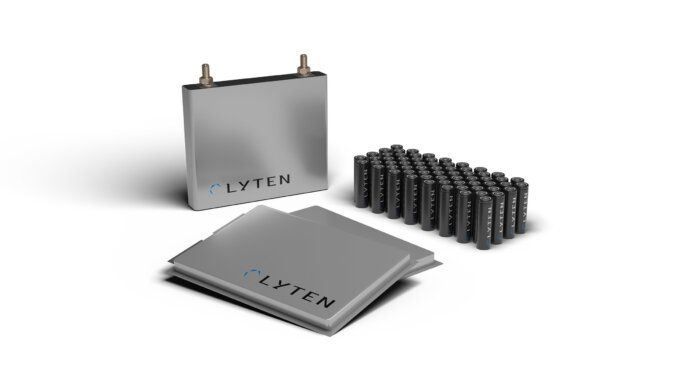Lyten, an advanced materials company, has introduced its LytCell EV lithium-sulfur (Li-S) battery platform. This latest battery innovation is optimized specifically for the electric vehicle (EV) market and is designed to deliver three times the gravimetric energy density of conventional lithium-ion (Li-ion) batteries.
Lyten has worked closely with the U.S. government for several years to test and improve LytCell capabilities in select defense-related applications. It is now ready to introduce its battery technology platform to the electric vehicle market.
The Lyten 3D Graphene-based Li-S architecture has the potential to reach a gravimetric energy density of 900 Wh/kg, which will significantly outperform both conventional lithium-ion and solid-state batteries. Lyten Sulfur Caging is the technology used in LytCell batteries to unlock the performance potential of sulfur by arresting the “poly-sulfide shuttle,” a cycle-life compromising factor that has up to now prevented practical Li-S use in battery electric vehicles. Under Department of Defense (DoD) test protocols, a LytCell prototype design has demonstrated greater than 1,400 cycles.
“We have begun a generational transformation from internal combustion engines to BEVs,” says Dan Cook, CEO and a co-founder of Lyten. “We’re confident that Lyten’s breakthrough battery platform will accelerate the mass consumer adoption of electric vehicle ownership due to the performance, range and safety improvements of our LytCell EV batteries. By also delivering the most environmentally responsible battery with a USMCA-compliant supply chain, we believe Lyten will enable automakers to more confidently execute their announced electrification roadmaps.”
Critical to Lyten’s battery breakthrough was the development of Lyten 3D Graphene, a novel three-dimensional graphene material platform that took years to refine. This unique material can be engineered and tuned at the molecular level to specific battery application requirements. The Lyten 3D Graphene platform enables Lyten’s advanced lithium-sulfur battery chemistry to realize exceptional levels of energy density, better temperature performance, faster charging and greatly improved safety.
Lyten’s batteries will be safer in vehicles than conventional Li-ion batteries because Li-S does not contain oxygen from metallic oxides, which is what drives thermal runaway events that have plagued many EVs.
The Lyten battery platform will also offer other advantages to automakers and their end users, including below internal combustion engine (ICE) cost parity, and safe and effective operation in environments as cold as -30º C to as high as 60 º C, enabling reduced system-level costs. They can be produced in cylindrical, pouch and prismatic formats. Other benefits include onshore cell manufacturing facilities proximate to OEM’s, faster charge times of less than 20 minutes and more.
“Lyten battery technology will offer an enormous leap forward for the automotive industry at a pivotal time when it is aiming to rapidly reinvent the future of electrified mobility,” says Greg Deveson, president of automotive at Lyten. “We see our LytCell EV batteries as a key enabler to improve EV performance and affordability.”
Lyten expects full production and market availability for ’25-’26 model year vehicles.
Beyond BEVs, LytCell battery technology is an attractive solution for commercial vehicle, electric flight, commercial aerospace and other applications. Lyten 3D Graphene technology has also been embedded in advanced sensors in addition to thermoplastic composites for vehicle light-weighting and strengthening applications.





